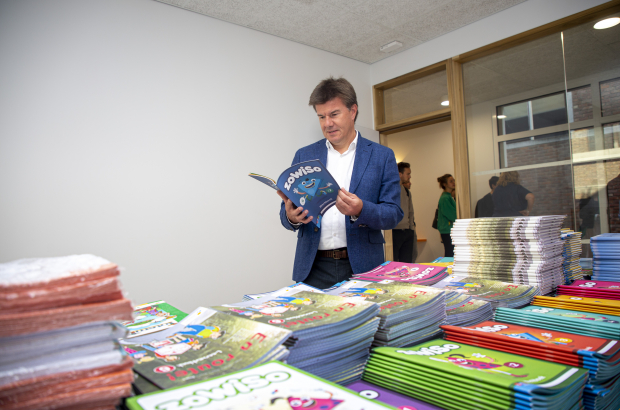- Daily & Weekly newsletters
- Buy & download The Bulletin
- Comment on our articles
Centralised hub planned for Brussels' multilingualism initiatives
According to a new study on multilingualism, Brussels has a truly diverse range of multilingual initiatives, but what is missing is an online platform that centralises all the information. Sven Gatz, Brussels' finance and budget minister, says he is working on creating such a platform.
Gatz, who is responsible for the promotion of multilingualism in the Brussels region, commissioned a study at the end of 2019 in which the existing multilingual initiatives in the capital would be mapped out and analysed. This study, carried out by the Brussels Studies Institute of the VUB and the ULB, is now available. It was presented on Monday afternoon to the Parliamentary Committee on Finance and General Affairs.
The researchers made an incomplete inventory of nearly 100 multilingualism initiatives, defining multilingualism as the combination of Dutch or French with another language.
Because the variety of initiatives was so large, they drew up four categories, starting with all courses, ranging from language courses and conversation tables for immersion education, to language learning online.
They also included interpreting services, the dictionaries at the Huis van het Nederlands, and other tools that support multilingualism.
A third category is publications and initiatives that provide information on multilingualism or promote multilingualism, the Brio Brussels research centre, for example, and the Marnix plan, which encourages the early learning of several languages.
Finally, there are the institutions and organisations that offer their services in several languages or which have developed a multilingual offer. For example, Brussels transport company Stib, which systematically makes its announcements in its stations in Dutch, French and English.
"There are already quite a few successful initiatives," concluded VUB professor Wim Vandenbussche, one of the authors of the report. "Moreover, there is strong support for multilingualism in Brussels today. Brussels is no longer the Brussels of the 1970s, 1980s and 1990s, when multilingualism divided the city. Multilingualism is a trait d'union today. That gives the city great potential."
What is missing is a platform on which all initiatives can be found. Sven Gatz promised that such a platform would be put in place. "We already have Be Talky (an initiative that encourages dialogues between different cultures in Brussels), but that's temporary. I am working on a permanent platform, in collaboration with Mr Clerfayt's (Bernard, Mayor of Schaarbeek) planned Language Point."
Furthermore, the authors found that there are still quite a few gaps. According to the report, the education system still has a lot of room for innovative projects. "There are only four secondary schools in Brussels Dutch-language education that offer a CLIL (Content and Language Integrated Learning) trajectory and there are few universities with truly multilingual programs," the report stated.
Public administrations could also do more to lead by example. "As far as the reception of users and access to information are concerned, bilingualism remains the rule," it continued.
The same goes for companies which could encourage their staff to go beyond traditional bilingualism. This also applies to the healthcare sector, which should pay more attention to the multilingual needs of staff and patients. For example, there are few hospitals with a social interpretation service.
And then there are the integration pathways that, according to the researchers, do not adequately correspond to the multilingual world of newcomers to Brussels. There is also a multilingual gap in the media, the report writes.
The inventory also revealed a lack of coordination between Community authorities. "This obstacle calls for the region to take the matter on itself," the report's authors said.
However, Brussels MP Gilles Verstraeten rejects that claim. "According to the current division of responsiblities, the communities are taking the initiatives,” the Flemish politician said. “If the region takes on the multilingualism policy, you get a third tier on top of everything," he added. "Isn't it better to work well together?"
This is what Sven Gatz hopes to address. "I have a coordinating function on multilingualism,” he said. “I have already consulted with the education ministers on the exchange of language teachers. It should start next year."
He will also contact the business sector, the cultural sector, the sports associations and his colleagues in the Brussels parliament, Alain Maron and Elke Van den Brandt for the integration projects. "I will have to work at every level in order to improve multilingualism in Brussels," Gatz concluded.

















